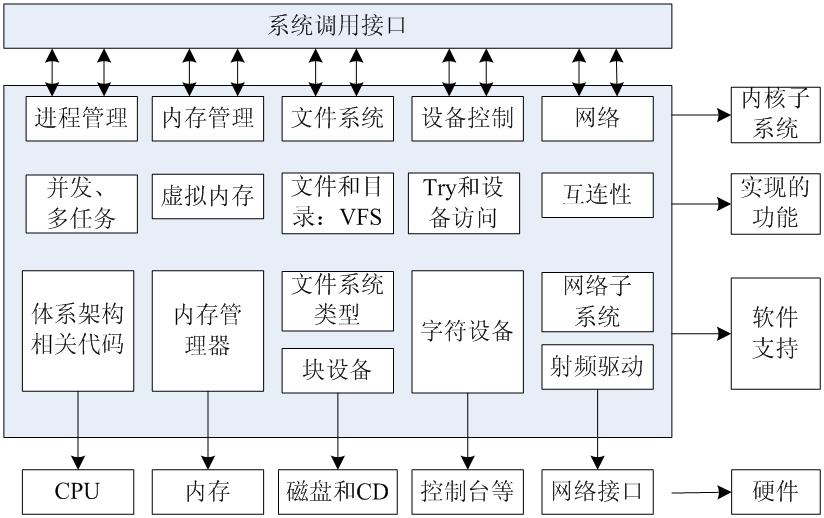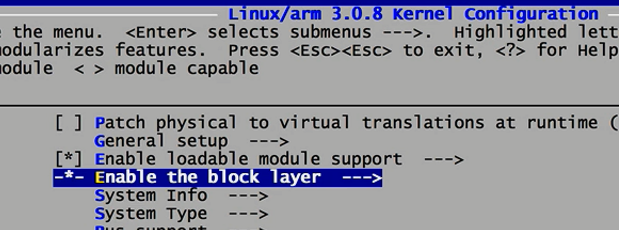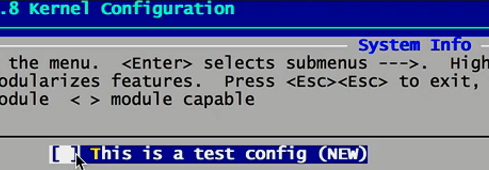内核移植的梯度:
初级:根据芯片公司的参考配置,编译开发板内核并了解执行过程
中极:添加内核驱动的方式方法
高级:修改或添加BSP包
linux内核特性:
可移植性强、支持的硬件平台广泛;超强的网络功能;多任务多用户系统;模块化的设计
五大子系统:
进程管理;内存管理;文件系统;网络协议;设备管理

内核获取路径:芯片厂商、内核源码官方
linux内核的目录结构层次结构:

平台相关目录树:arch目录下
平台无关目录树:其它
crypto目录:算法、加密涉及的源码目录
Documentation目录:内核官方文档
fs目录:文件系统的信息
ipc目录:进程间通信的机制
mm目录:内存
driver:驱动相关
内核源码开发的头文件命名规范
#include <asm/xxx.h>:与CPU体系结构(arch)相关的头文件
#include <linux/xxx.h>:平台无关的头文件
#include <plat/xxx.h>:与某款芯片公司相关的头文件
#include <mach/xxx.h>:与开发板配套的头文件
配置内核
1.配置哪些目录需要编译
2.配置哪些文件需要编译
配置方法:Makefile
主目录Makefile:
包含体系结构下的Makefile
# Use LINUXINCLUDE when you must reference the include/ directory.
# Needed to be compatible with the O= option
LINUXINCLUDE := -I$(srctree)/arch/$(hdr-arch)/include \
-Iarch/$(hdr-arch)/include/generated -Iinclude \
$(if $(KBUILD_SRC), -I$(srctree)/include) \
-include include/generated/autoconf.h
hdr-arch := $(SRCARCH)
#包含体系架构下的Makefile include $(srctree)/arch/$(SRCARCH)/Makefile
ARCH ?= arm CROSS_COMPILE ?= /opt/FriendlyARM/toolschain/4.5.1/bin/arm-linux- # Architecture as present in compile.h UTS_MACHINE := $(ARCH) SRCARCH := $(ARCH) # Additional ARCH settings for x86 ifeq ($(ARCH),i386) SRCARCH := x86 endif ifeq ($(ARCH),x86_64) SRCARCH := x86 endif
各个子目录的Makefile
例:arch/arm/mach-s5pv210下的Makefile

# arch/arm/mach-s5pv210/Makefile # # Copyright (c) 2010 Samsung Electronics Co., Ltd. # http://www.samsung.com/ # # Licensed under GPLv2 obj-y := obj-m := obj-n := obj- := # Core support for S5PV210 system obj-$(CONFIG_CPU_S5PV210) += cpu.o init.o clock.o dma.o obj-$(CONFIG_CPU_S5PV210) += setup-i2c0.o obj-$(CONFIG_S5PV210_PM) += pm.o sleep.o obj-$(CONFIG_CPU_FREQ) += cpufreq.o # machine support obj-$(CONFIG_MACH_AQUILA) += mach-aquila.o obj-$(CONFIG_MACH_SMDKV210) += mach-smdkv210.o obj-$(CONFIG_MACH_SMDKC110) += mach-smdkc110.o obj-$(CONFIG_MACH_GONI) += mach-goni.o obj-$(CONFIG_MACH_TORBRECK) += mach-torbreck.o # device support obj-y += dev-audio.o obj-$(CONFIG_S3C64XX_DEV_SPI) += dev-spi.o obj-$(CONFIG_S5PV210_SETUP_FB_24BPP) += setup-fb-24bpp.o obj-$(CONFIG_S5PV210_SETUP_FIMC) += setup-fimc.o obj-$(CONFIG_S5PV210_SETUP_I2C1) += setup-i2c1.o obj-$(CONFIG_S5PV210_SETUP_I2C2) += setup-i2c2.o obj-$(CONFIG_S5PV210_SETUP_IDE) += setup-ide.o obj-$(CONFIG_S5PV210_SETUP_KEYPAD) += setup-keypad.o obj-$(CONFIG_S5PV210_SETUP_SDHCI) += setup-sdhci.o obj-$(CONFIG_S5PV210_SETUP_SDHCI_GPIO) += setup-sdhci-gpio.o
obj - y := 编译进内核
obj - m := 以模块形式编译
obj - n := 不编译
obj - := 不编译
哪些文件需要编译?
CONFIG_XXX
配置单:
在/arch/arm/configs默认目录下
配置过程:
1、导出需要的默认配置文件到主目录下并更名为.config
2、交叉编译器的修改
3、体系结构(System Type)的选择:S5PV210

ARCH ?= arm CROSS_COMPILE ?= /opt/FriendlyARM/toolschain/4.5.1/bin/arm-linux-
4、配置单(.config)增删改查--->使用make menuconfig实现图形化更改配置
Kconfig----> make menuconfig ---> .config ---->Makefile
Kconfig语法:
source:相当于include描述一包含关系
menu、endmenu:用来定义菜单如:
menu "System Info" end menu
执行make menuconfig 则:
.config中增加一条:CONFIG_ABC = y
即config ----> CONFIG_ABC =y---->Makefile中的obj-$(CONFIG_ABC) += xx.o
通过make menuconfig中的-----相应选项的help----->找到相应选项的Kconfig---->Makefile中对应的文件 .c
例如:
找menuconfig下的Samsung SoC serial support定义的(Kconfig)位置:
法一:选中这个选项键盘单击h按键
法二:搜索grep -nR "Samsung SoC serial support"
同样在Kconfig所在目录下的Makefile文件即可找到对应的.c文件
通过Makefile .o ----->找到Kconfig:同上↑
config:用来配置菜单子目录的内容
menu "System Info" config ABC bool "This is a test config"
help
Support test config endmenu
执行make menuconfig 则:
Kconfig配置主线

# For a description of the syntax of this configuration file, # see Documentation/kbuild/kconfig-language.txt. # mainmenu "Linux/$ARCH $KERNELVERSION Kernel Configuration" config SRCARCH string option env="SRCARCH" source "arch/$SRCARCH/Kconfig"
---->source “arch/$SRCARCH/Kconfig”

config ARM bool default y select HAVE_AOUT select HAVE_DMA_API_DEBUG select HAVE_IDE select HAVE_MEMBLOCK ....... ........... config HAVE_PWM bool config MIGHT_HAVE_PCI bool config SYS_SUPPORTS_APM_EMULATION bool config HAVE_SCHED_CLOCK bool config GENERIC_GPIO bool ............ ................ menu "Power management options" source "kernel/power/Kconfig" config ARCH_SUSPEND_POSSIBLE depends on !ARCH_S5P64X0 && !ARCH_S5PC100 depends on CPU_ARM920T || CPU_ARM926T || CPU_SA1100 || \ CPU_V6 || CPU_V6K || CPU_V7 || CPU_XSC3 || CPU_XSCALE def_bool y endmenu source "net/Kconfig" source "drivers/Kconfig" source "fs/Kconfig" source "arch/arm/Kconfig.debug" source "security/Kconfig" source "crypto/Kconfig" source "lib/Kconfig"
--->source "net/Kconfig"
--->source "drivers/Kconfig"
--->source "fs/Kconfig"
--->source "arch/arm/Kconfig.debug"
--->source "security/Kconfig"
--->source "crypto/Kconfig"
--->source "lib/Kconfig"
添加驱动到Linux内核中的步骤:以myled.c字符驱动为例
1.可以在/drivers/char/目录下新建文件夹mydriver,然后复制myled.c到mydriver目录
2、在driver目录下创建Makefile文件

obj-$(CONFIG_MYLED) += myled.o
3、在上层的Makefile文件添加一句obj-y += mydriver/这样上层Makefile文件就会找到mydriver目录下的Makefile文件
4、在driver目录下创建Kconfig文件
menu "My Personal Device Driver" config MYLED bool "Support myled device driver" help Support led driver for S5PV210 endmenu
5、在上层的Kconfig文件添加一句source "driver/char/mydriver/Kconfig"这样上层Kconfig文件就会找到mydriver目录下的Kconfig文件
6、执行make menuconfig 选中My Personal Device Driver --->Support myled device driver之后执行make uImage 重新编译内核即可
内核编译过程
make :
make Image make zImage make uImage (专为uboot启动准备的内核镜像 ) //编译的是obj-y
make modules //编译的是obj-m
make uImage (vmlinux-->Image-->vmlinux-->zImage-->uImage)
直接执行make uImage 报错解决办法:
进入u-boot源码,在编译完成的uboot源码中进入tool目录,找到mkimage文件,将其复制到/bin根目录
vmlinux :OS elf file ---OBJCOPY拷贝生成Image
Image:未压缩,所以比较大
zImage:经过压缩的Image文件
自定义BSP的过程
